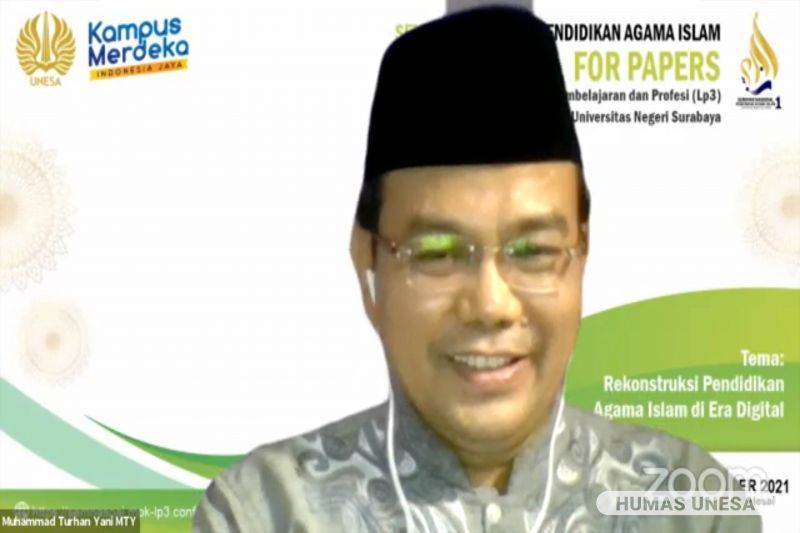
www.unesa.ac.id
Unesa.ac.id, SURABAYA-The Institute for Learning and Professional Development, State University of Surabaya (LP3 UNESA) held a National Seminar on Islamic Religious Education and Call for Papers (SEMNAS PAI 1) with the theme "Reconstruction of Islamic Religious Education in the Digital Era" on Thursday, October 14, 2021.
The event which was held virtually was attended by Prof. Ah. Muzakki, M.Ag, Grad.Dip.SEA, M.Phil, Ph.D., Dean of FISIP, Sunan Ampel Islamic University, Surabaya and Dr. H. Aam Abdussalam, M.Pd., General Chairperson of the Indonesian Islamic Education Lecturer Association. In addition, there is also Prof. Dr. Kasuwi Saiban, M.Ag., PAI Lecturer and Chair of the Senate of the Merdeka University, Malang, and Yusuf Hanafi, Chair of the East Java ADPISI DPW.
Prof. Dr. Bambang Yulianto, M.Pd, Vice Chancellor for Academic Affairs in his speech revealed that Islamic religious education is a subject or courses whose purpose is to produce students who have a religious spirit and obey their religious orders.
Furthermore, he explained that Islamic religious education is one of the general subjects (MKU). The MKU is a group of courses intended to develop aspects of the personality of students as individuals and citizens of society so that they are expected to have qualified knowledge.
Prof. Muzakki as the first speaker delivered material about religion in the midst of change, the implications of change in religion and how to rearrange it. According to him, there are several impacts on religion, including changes in preferences and increasing individual autonomy.
Furthermore, he explained how to rearrange Islamic religious education, namely by not teaching the same things as what our parents taught us and educating or teaching children by example. In addition, Islamic religious education includes two things, namely academic scholarship and Islamic da'wah.
Meanwhile, Aam Abdussalam delivered material on 'Wasathiyah Paradigm Solutions to Modern Education Problems'. He explained about a comprehensive and integrative learning process in which the learning process must reveal and reveal the direction of which must be able to apply it in real life, enforce it in the regulatory system, and be able to maintain balance.
On the same occasion, Prof. Dr. Kasuwi Saiban delivered material on 'Reconstruction of Islamic Religious Education (PAI) in the Digital Era'. He explained that there are three groups of people in the digital era that must be avoided, namely being carried away, meaning all information is swallowed raw, distorting the flow, meaning all information is rejected, and coloring the flow, meaning that all information is processed and colored as desired.
Meanwhile, Yusuf Hanafi delivered material on 'Challenges and Responses to Islamic Religious Education in the Digital Age'. According to him, change is sunnatullah, which can also be called natural law, namely the law established by Allah to regulate the creation and mechanism of the universe which is natural, which is fixed and automatic. [Wulida/Zam]
Share It On:






